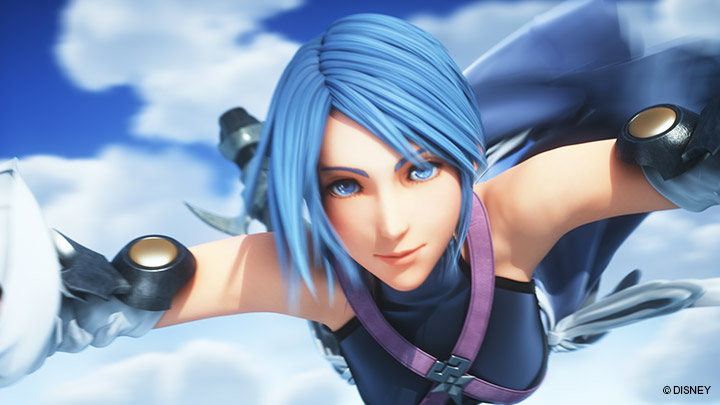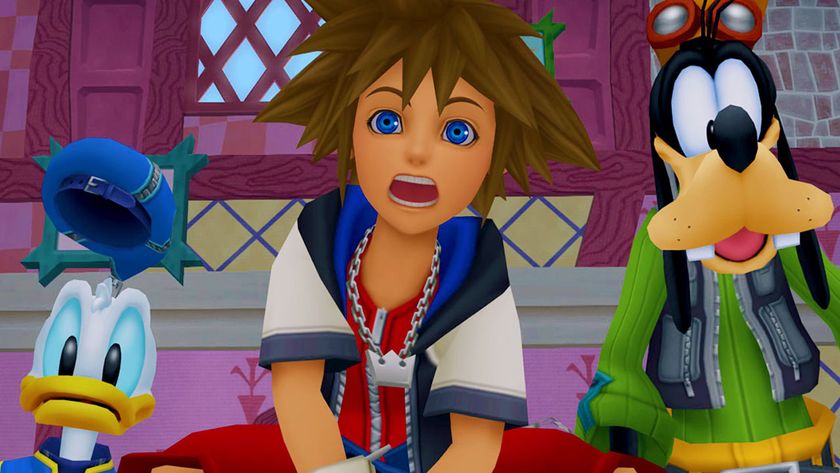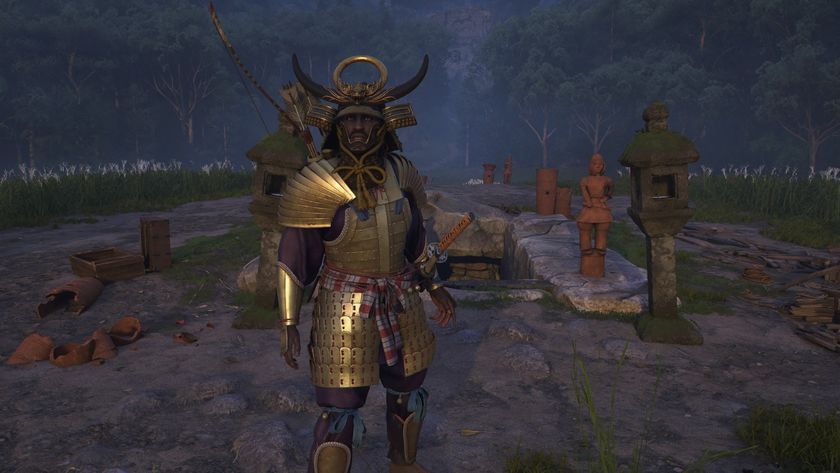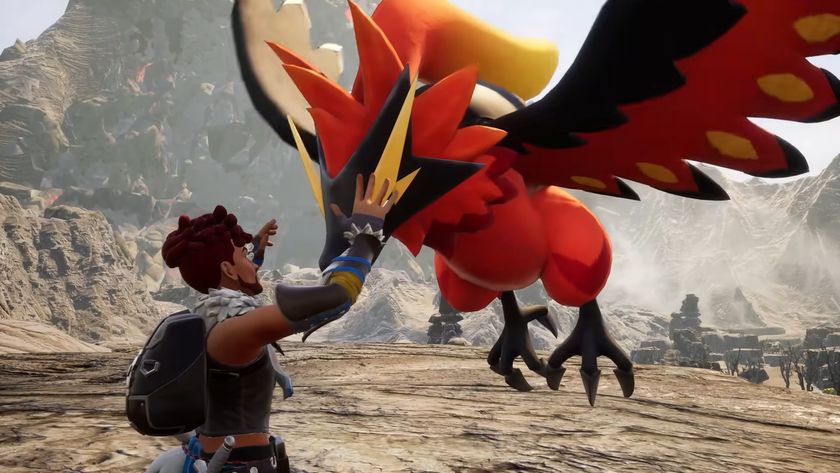12DOVE Verdict
Kingdom Hearts HD 2.8: Final Chapter Prologue is essential for the faithful, flummoxing for newcomers, and a promising start to the series' life on PS4.
Pros
- +
Kingdom Hearts 0.2 is a welcome return to modern console tech for the series.
- +
Kingdom Hearts Dream Drop Distance is a lengthy, excellent action RPG.
- +
Breezy combat complements the bizarre story.
Cons
- -
Dream Drop Distance's repetition and big, empty environments are more suited to portable gaming.
- -
The whole package is forbidding for new players.
- -
The Kingdom Hearts χ [chi] Back Cover movie makes no sense at all.
Why you can trust 12DOVE
Kingdom Hearts HD 2.8: Final Chapter Prologue, like all Kingdom Hearts games for the past decade and a half, prominently features Utada Hikaru’s pop song 'Simple and Clean'. Now more than ever, it’s clear that this theme song is not just catchy as hell, it’s also some kind of ongoing elaborate troll. Kingdom Hearts is many, many things, but it is neither simple nor clean. Included in this package are a remastered 3DS game, a three hour playable prologue to Kingdom Hearts 3, and an hour long movie. They are respectively about dream projections of the original characters in a spirit world, a semi-sequel to a PSP game about a character stuck in hell (yes, HELL), and the movie is about a group of weirdoes in animal masks talking about war. No Final Fantasy or Disney characters show up in the movie. Not simple. Not clean. Yet somehow, if you let it, Kingdom Hearts HD 2.8: Final Chapter Prologue can still seduce you. Beneath the surreal pontificating, the anime posturing, and the increasingly odd presence of a demigod warrior Mickey Mouse hanging with young adults is a game still worth playing.
While the HD remaster of Kingdom Hearts: Dream Drop Distance is the most substantial piece of the 2.8 pie, the main attraction is really Kingdom Hearts 0.2: Birth By Sleep A Fragmentary Passage. How strange that these names are just standard. That Disney, a company deeply committed to keeping its most famous characters safe and recognizable, keeps letting this partnership continue is equally baffling and impressive. Built in Unreal Engine 4 and the first brand new Kingdom Hearts content made for a home console in over a decade, A Fragmentary Passage fills in yet another small story gap connecting all the games to date and gives a taste of what to expect in the big sequel coming to PS4 and Xbox One... soon(ish). It’s gorgeous, confusing and fun but it might not be the evolution in terms of action that people have been hoping for. The combat, exploration, and presentation are smooth but strip away the modern sheen and it feels a whole lot like Kingdom Hearts 2 did on PlayStation 2 back in 2006.
Aqua, one of the three stars of Birth By Sleep for PSP, is the star. After the end of that game, she’s trapped in the Dark World, a sort of supernatural home for evil and hopelessness. Boiling down Kingdom Hearts’ story to its most basic elements, here’s the conflict: the battle between dark and light, good and evil, inside everyone is an actual physical war in this universe. Kingdom Hearts is the source of light and goodness, an actual place that can be summoned. The Dark World you play through as Aqua in A Fragmentary Passage is the source of the darkness that’s been gobbling up other worlds like Agrabah and Cinderella’s castle since the first game.
Her journey feels like a lonely version of one of those larger Disney themed stages in past games. Explore a broken, shady town outside of what looks like Cinderella’s castle, solve light puzzles like finding hidden clockwork gears that can fix a broken bridge, and fight mobs of inky goblins called Heartless, another series staple. Speedy but sometimes uncomfortably airy, Aqua moves over the wet streets and creepy halls of A Fragmentary Passage’s three hours almost like her body doesn’t fully connect with the world around her. Once you’ve gotten used to her pace, though, the speed serves the combat well, a button-mashy take on simple sword play that favors staying in mid-air. Slam the attack button, Aqua chains together brief combos with her Keyblade, and she’ll automatically target the closest enemy even if it’s 50 feet off the ground. Chained attacks can activate some extra flashy and damaging super moves and she has access to simple spells. In between all the exploration and fights is some light platforming as well, and where the floaty feeling characteristic of these games has made jumping up buildings and over bottomless pits troublesome before, it feels good here.
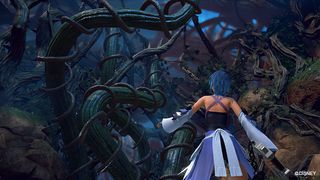
All of this ultimately feels like a particularly luxurious demo for a bigger game, more elaborate than glorified and expensive samples like Metal Gear Solid 5: Ground Zeroes but still not truly substantial. The game tries to mask the absence of real character customization - Aqua’s spells and abilities are locked - by giving you costume add ons for achieving secondary goals. Kill 30 flying fire enemies, get a set of cat ears for Aqua. Padding like that could feel cynical, and it likely will for anyone that can’t follow the story. That probably accounts for a big chunk of the audience. Who Aqua is, why she’s plagued with self doubt, why she’s in Kingdom Hearts hell, and when all this takes place will only make sense to people who can remember the very last scenes in a PS2 game, a PSP game, and a 3DS game that are respectively eleven, seven, and five years old. A Fragmentary Passage makes zero effort to catch anyone up, and its ending when Aqua can fight alongside Mickey Mouse before giving us a glimpse of Kingdom Hearts 3’s stars will be as flummoxing as the beginning. For the initiated, though, this slice of game is mana from heaven. Aqua was the absolute best part of Birth By Sleep, a surprisingly adult and likable character in a game that started ostensibly as fan service for tweens. Seeing her here, if you’ve stuck with and retained the story, is wonderful.
Were A Fragmentary Passage the only part of the 2.8 package, it would be a ripoff. Dream Drop Distance, however, is an excellent, substantial action RPG. It’s no less weird than Passage; identifying with its character also requires intimate knowledge of every previous game on top of getting on board with its bizarre premise. Sora and Riku, best frienemies forever, aren’t even the main characters. It’s dream versions of them visiting Disney worlds like Tron Legacy, fighting nightmare creatures as part of a test to become masters of their key swords.
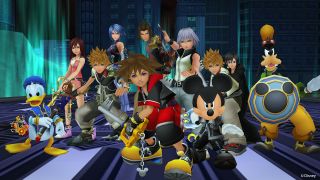
Dream Drop Distance benefits from the series’ past combat and some of its best mashups. Rather than just bashing attack buttons, you can tap square and rail grind most everything in the environment making for some flashy, simple manoeuvres. No other game will let you latch onto a lamppost, endlessly spin in a circle while hitting a neon demon cat in the face, while Neku from The World Ends With You and a realistically modelled Jeff Bridges in white robes stare on. There’s also a ton of savory, fiddly customization in the Dream Eaters. Sora and Riku can be backed up by little neon pet monsters you can conjure using items found in the game. Pause the game and enter a menu, you can raise a little bright blue cat-dog by petting him with the analog stick, feeding him treats, and using experience points to level up his skills. There are a ton of these critters to find, and they can join you in fights as both support and a basis for bigger attacks.
The story, like in Passage, is going to delight fanatics. That’s not what holds Dream Drop Distance back; its origins as a portable game are its primary problem. Back in 2012, this was one of the best 3DS games period but its simple graphical style, huge but empty levels, and crowded array of health bars and other interface info just doesn’t feel suited to a television. Square’s done an admirable job cleaning the game up for consoles. Even the Dream Eater pet raising, originally dependent on the touch screen, works well, but it doesn’t feel natural. More problematic is the Drop System. Both characters have to play through the same stages, and you’re on a constantly draining timer before you have to switch from one character to another. When you’re only playing in bed or on the go in short bursts on a 3DS, the repetition and time management play well. The extended play times of TV gaming are just another factor that make Dream, Drop, Distance a very good but awkward on a PS4.
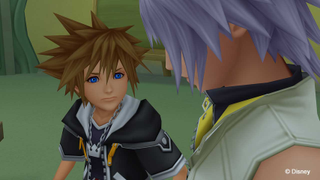
The games in Kingdom Hearts 2.8 make it well worth it for fans. I’m one of those fans. Kingdom Hearts χ [chi] Back Cover, the hour long movie tying into the iOS spinoff Kingdom Hearts χ, will flat out alienate everyone who sees it. There are no Final Fantasy or other Square characters in it. There are no Disney characters in it. By the end I’d figured out through inference that it was a backstory to the Keyblade War, a climactic event referred to in old games that caused the conflict between dark and light to get out of whack in the first place, but even that’s shaky based on what’s here. A series of vaguely connected dialogues between bizarre characters in animal masks running 'unions' of keyblade users who you never see, it is the most impenetrable thing creator Tetsuya Nomura has ever put his name on.
That’s coming from someone who found A Fragmentary Passage pretty stirring. Back Cover may be an emotionally dead curio, but it doesn’t take away from the quality of the games alongside it, though. Play these and the upcoming re-release of Kingdom Hearts 1.5+2.5 on consoles, and you’ll actually know what’s going on in Kingdom Hearts 3. What’s more, you’ll probably love them by the end.
More info
| Genre | Role Playing |
